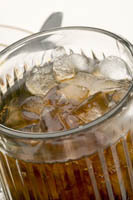
Sweet but deadly?
(click to enlarge)
In a study done at Boston University, Dr. Ramachandran S. Vasan and colleagues found that those who drank more than one soda daily had a higher prevalence and incidence of heart disease risk factors than those who drank less.
The study was published online in Circulation, Journal of the American Heart Association. This finding follows in the footsteps of an analysis of the Framingham Heart Study that found that soft drink consumption contributes to obesity and insulin resistance in children and hypertension in adults. In this study, from 1987 to 1995, those participating were followed with a physical exam, food intake questionnaires, and a fasting plasma lipid, glucose and triglyceride measurement approximately every four years.
American Heart Association spokesperson, Richard Stein, M.D. of NYC said that the lack of difference in risk between artificially sweetened and regular drinks indicated that drinking soda might be an indicator for overall eating habits that contribute to the risk for heart disease brought on by metabolic syndrome. He went on to say that heart disease is brought on by many lifestyle factors and these findings should be a wake up call for many individuals.



Ad Statistics
Times Displayed: 51274
Times Visited: 1489 Ampronix, a Top Master Distributor for Sony Medical, provides Sales, Service & Exchanges for Sony Surgical Displays, Printers, & More. Rely on Us for Expert Support Tailored to Your Needs. Email info@ampronix.com or Call 949-273-8000 for Premier Pricing.
What is Metabolic Syndrome?
Three or more of the following indicators could be a symptom of metabolic syndrome:
-Waist circumference of at least 35 inches for women -- 40 inches for men.
-Fasting blood glucose at least 100 mg/dL
-Serum triglycerides at least 150 mg/dL
-High-density lipoprotein cholesterol higher than 30 mg/dL for men - 50 mg/dL for women.
Of all those who participated who answered the Framingham Heart Study questionnaire, 35% said that they did drink at least one 12-ounce soft drink per day, and 22% reported drinking an average of one diet or regular soda a day. The findings also showed that the results were similar whether soda was caffeinated or decaffeinated. The researchers did note that the similar metabolic danger posed by both regular and diet soda is important because of the lack of calories in diet soda.

